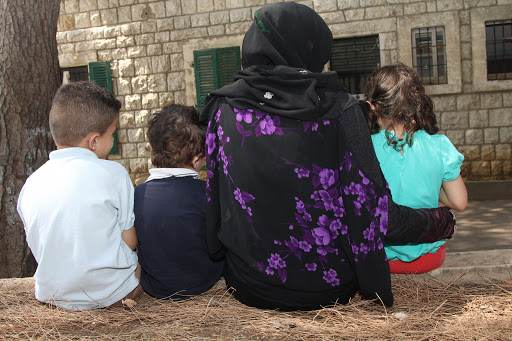The private life of women lost their husbands in war

"I am not for sale and exploitation, I am a woman who can do what men do and more, my ambition is to not need anyone, and to succeed in raising my daughter outside of the suffering that I have experienced, so that she will not be humiliated to anyone for a few pounds".
Faten (38 years) ends her words with this phrase, and she is one of the women whose lives were changed because of the war, beginning with displacement in 2012, then her husband abandoned her shortly after that, leaving her with a young daughter without shelter, Faten now lives in a small basement, which she was able to restore and make habitable, after she stayed for years without a place for her and her daughter, the days of searching for work and the years of exploitation ended, so that she could find the right place and work.
Faten rejects the idea of getting married again, and she has her reasons. She is a woman whom the war was able to change in her to become stronger and stricter, and her only concern becomes her 17-year-old daughter. Marriage in itself is not what causes her trouble, but rather the nature of the men she met since she was displaced Her home, and the trauma of her first marriage.
“I do not trust men. I have not met a man whose goal is to get married, and to establish a relationship to which both of us are committed, all they wanted is a fleeting sexual relationship, and some of them offered me money for that, but I refused, and if a man came to me who wants to marry me, I will not approve, because my daughter has become young and I fear for her from them, there is no man you can trust today".
Hundreds of Syrian women who lost their husbands in the war, face the same fate as Faten, a complete absence of sexual life, after they became the only ones responsible for their lives and their children. Most of these women are not educated, or aren’t able to find decent job opportunities. Women, because of their society and the surrounding environment, used to stay at home, raise children and take care of their men, only to find themselves suddenly without a home or a man, or a profession in which to work to continue their lives, the lives of these women began from the moment they began losing everything, they went out into the world to find themselves alone and strong enough to live without a man to follow.

On one hand, it seems that the absence of a man from the lives of Syrian women affected by the war has a positive impact on their status as women, as the change that took place in their lives prompted them to abandon and confront many societal habits. These women are no longer restricted, but rather they have become directly responsible for their lives, and this is what drove them to go out of their houses to work, clash for the first time with the outside world, and discover their rights that were taken away by keeping them locked up in the house.
But on the other hand; In addition to the psychological damage that resulted from the loss of their husbands, this loss constituted a complete absence of the emotional and sexual life of these women, which is considered an unhealthy matter. The woman who lost her husband lost her right to pleasure and emotional stability with him, and thus she became aware of societal habits; That she is imperfect, she is not a virgin who can search freely for a husband, her marriage is conditional, and she is unable to establish a relationship outside of marriage, because she is in a society that prohibits this for women, as the widow and divorced woman in our society does not have the right to think about her emotions and desires, her life must be dedicate to her children, and her entry into any relationship will constitute yet another pressure on her and disapproval of those around her.
Nisreen, 35 years old, is another victim of this kind, she lost her husband in the war in 2013 and she has four children. She suffers from a complete absence of the emotional side in her life and this puts a burden on her. She says: “I’m tired of this emptiness, the days are going by the same, I hope that something different happens, that someone cares for me, that I feel happy. I always think of my emotions, but I feel that my children are more important, because a stepfather may destroy their lives".
Nisreen's family, and the family of her deceased husband, constitute the main obstacle to her establishment of any relationship. She got married at the age of thirteen, and now she is still in the prime of life, and despite the war changing her lifestyle and her ability to go out and work, her personal life is not her property, they are watching her movements closely, considering that she has no rights, but only one duty; preserving her children, completely ignoring her young age and her right to have another relationship.
Virtue in Arab and Islamic societies is linked to a woman’s sexuality, for her sexual behavior is the standard through which her own virtue is reflected in the children, family and society around her. So, personal and intimate life becomes a subject for analysis, prohibition and interference by others, at a time when all the right virtues are not dropped, from her ability to bear burdens alone, work and raise children, they make her private life the axis on which its value is built, and this value comes from her own neglect of any desire within her, and her refusal to any form of association, rather than she has a normal life that she enjoys within a good and healthy relationship, It becomes the subject of discussion and a general problem that concerns everyone around it.
If we ignore all the other pressures afflicting a lonely woman, we will find that the absence of sexual life is the cause of many biological and psychological problems, because the relationship with the opposite sex is a natural need for all human beings, and in the case of women in our society, her emotional and sexual desires struggle within her with the oppression practiced on her from society, and preventing her from establishing any form of relationship after losing her husband, and this is what makes her suppress this need, which leads to psychological and nervous disorders apart from organic damage to her.
This problem seems to be very present in Syria after the war, with a large number of women who lost themselves with the loss of their husbands, and live daily fear and loneliness, while they watch all the time around them, with the loss of their private lives they gradually lose their femininity and feminine features. They lost their confidence and their lives become worthless except for what they give to others.
At the same time when society forbids a woman, after losing her husband, to enter into another relationship, she puts another pressure on herself, due to the general morals, which have been entrenched within her, she ends her own life by the end of her first experience in marriage, and any attempts at closeness and courtship to her become associated with feelings of guilt, prevents her from proceeding in any relationship, and all of her endings are doomed to failure.
The organizations concerned with women's rights do not pay any attention to this aspect in their speeches, and the woman's right to practice her sexual life in the way she wants, regardless any evaluation of her social status, whether she is single, divorced or widowed, at the time that religious and community men are strict in this regard. In some cases, she is forced to be married to her husband's relatives or one of his brothers after his death, to ensure that her children remain with them, and this is considered a restriction and coercion for her.
Faten continues her life with hundreds of other women in this way, forgetting day after day of herself and her desires: “I don't care about having a man in my life anymore. A few moments are when I feel that I am alone and in need of a partner, I expel it, and turn to continue my life on my own, there is no difference, sometimes the presence of a man in a woman’s life is just like his absence; if she is only a tool for his service".



